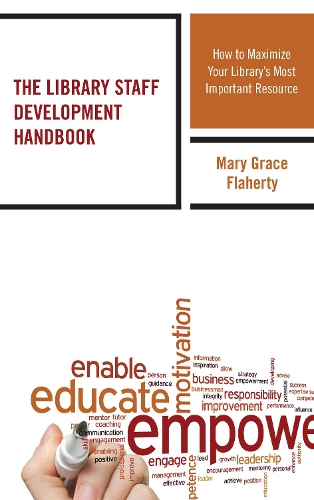
The Library Staff Development Handbook: How to Maximize Your Librarys Most Important Resource
(Hardback)
Available Formats
Publishing Details
The Library Staff Development Handbook: How to Maximize Your Librarys Most Important Resource
By (Author) Mary Grace Flaherty
Bloomsbury Publishing PLC
Rowman & Littlefield Publishers
8th August 2017
United States
Classifications
Professional and Scholarly
Non Fiction
Personnel and human resources management
023
Winner of Doody's Core Titles 2020
Physical Properties
Hardback
154
Width 159mm, Height 238mm, Spine 19mm
422g
Description
The Library Staff Development Handbook: How to Maximize Your Librarys Most Important Resource provides practical tips, suggestions for resources, and concrete examples for addressing the multiple and varied aspects of staff development. From crafting a job description to recruitment, hiring and retention, and from progressive discipline and succession planning to continuing education, performance appraisals, and the importance of workplace fun, this handbook can serve as a companion for managers, supervisors and library staff as they negotiate the challenging range of staffing issues and the opportunities they provide in the library setting.
Reviews
Flaherty offers library staff with varying levels of supervising experience an accessible, well-organized guide filled with a plethora of resources. Drawing on firsthand experience, the author provides valuable advice on everything from recruiting prospective candidates and cultivating a positive workplace culture to promoting continuing education and conducting ongoing performance appraisals. New supervisors will find rubrics and charts on, for instance, evaluating job candidates interview responses, invaluable. Each chapter ends with a bibliography. While there are many materials on staff management, Flahertys volume stands out for its relevance to libraries. VERDICT: Highly recommended for current and aspiring library supervisors interested in building their management skills and developing an efficient and cohesive staff. * Library Journal *
Flaherty, assistant professor at the School of Information and Library Science at the University of North Carolina at Chapel Hill, lays out the basics for leading a successful library staff, beginning with a compelling argument for stepping back from daily duties to proactively focus on staff development.... Flaherty reveals her breadth of experience, which makes the book applicable to just about any library environmentpublic, academic, and specialand solo librarians are also specifically addressed. This is an essential resource for new supervisors or those trying to solve a staff-retention or morale problem. * Booklist *
The Library Staff Development Handbook by Mary Grace Flaherty is just the book to guide both the seasoned and newbie library supervisor alike. * Journal of the Medical Library Association *
Librarians and library supervisors who have the responsibility for empowering and nurturing their staffs will find real gems of practical advice, templates, tips, and personal connections in this staff development handbook. In this guide, Flaherty has captured the positive, supportive, and nurturing tone that libraries must create within their organizations to recruit, hire, train, and maintain effective and engaged staffs. Supervisors will want to keep this book handy and refer to it often. -- Barbara Stripling, Senior Associate Dean and Associate Professor of Practice, School of Information Studies, Syracuse Unviersity, President, American Library Association, 2013-2014 and President, New York Library Association, 2016-2017
A key feature of The Library Staff Development Handbook is the inclusion of case studies and templates to help put staff development concepts into practice. . . . The author strikes an excellent balance between providing a general overview of staff development topics and providing enough granular detail on how to implement these activities. * The Library Quarterly *
Author Bio
Mary Grace Flaherty is an assistant professor in the School of Information and Library Science at the University of North Carolina at Chapel Hill. She received her PhD from Syracuse University and holds masters degrees from Johns Hopkins University and the University of Maryland.
